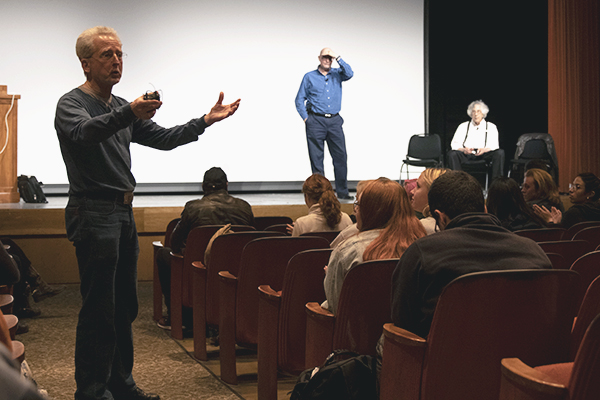In a lecture geared toward first-year students Tuesday evening, scholars discussed the realities of immigrant life in America and encouraged people to show empathy toward immigrants.
“Immigration and Imagination” was another entry in the University Lecture Series, a series of discussions presented by the School of Undergraduate Studies. The purpose of the lectures is to help introduce first-year students to the renowned scholars that UT has to offer by creating a dialogue among staff and students, according to the school’s website. The discussion was led by UT philosophy professor Aloysius Martinich, UT classics professor Thomas Palaima and Micheal Lesy, a professor emeritus of literary journalism at Hampshire College.
This lecture was about immigration at the turn of the 20th century and immigration today, including how American society has treated immigrants in both eras. The three speakers discussed their family histories and examined the reasons people want to come to America.
Martinich said immigrants contributed to building America into what it is and are not recognized for their efforts.
”Whatever the wave of immigrants or where they are from, people are always treated poorly,” Martinich said. “But then one or two generations later, they become Americans just as any other group.”
Martinich said this generation needs to learn to break the cycle.
“Every immigrant group comes over here ‘poor or ignorant or despised,’ but then eventually, with time, they are the ones who despise the immigrants,” Martinich said.
Palaima said Americans do not have sympathy toward immigrants as they try to pursue a better life.
“Sympathy is quite literally suffering along with other people,” Palaima said. “Empathy has to do with suffering in the place, the shoes, of other people. You learn what it feels like to be invisible to all of those walking around you. It is like how homeless people feel, with people sidestepping you and avoiding eye contact.”
Palaima said the struggles of immigrants today are changing with legislation that tightens border control.
“You cannot imagine what it’s like to be an immigrant: poor, with no family protection around you,” Palaima said.
The presentation included a series of photographs of immigrants throughout history, and Lesy said the photographs showed how immigrants’ emotional plights have remained the same.
“Taking pictures was, until now, an act of stopping time,” Lesy said. “Of remembering things, and bringing memories back to life again. Photographs can change the story that you’re told about history.”





















